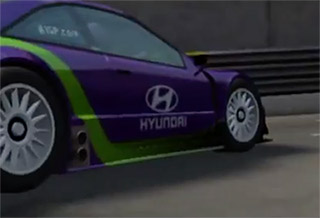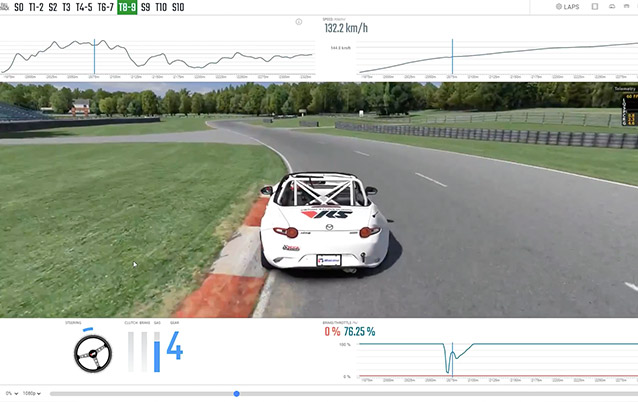One of sim racing’s veterans, expert on both race and vehicle dynamics, driver for Coanda Simsport, and one of the VRS coaches: David Williams from Southampton, United Kingdom. We catch up to talk about what it’s like to coach sim racing online.
First of all, how did you get into sim racing and this role?

From as early as I can remember I’ve loved cars and racing. I watched a kart race in person as a small child, and it captivated me. Most of my toys were planes, helicopters or cars. Basically anything with an engine. I dreamt of becoming a Concord pilot, and later a Formula One driver. Growing up on the small Channel Island of Alderney, karting was non-existent, so racing games became my hobby.
My first proper sim was Live for Speed in 2006, where I joined the team of Clownpaint Gaming. We did quite well and won championships, and shortly after the teamed changed it’s name to My3id Gaming where we had further success. iRacing then came onto the scene and most of the competition moved there so we followed suit. Again, the team performed very well, ultimately taking the iWCS title with Hugo Luis and continued to evolve as a whole, later becoming 3id Motorsports.

At this time, wishing to pursue real motorsport, I entered GT Academy in 2011, where I made it to the national finals in person at Brands Hatch, but was beaten badly in the gaming element where random cars and tracks were chosen for three lap races. In 2012, I prepared much better, and made it through to the European final at Silverstone. This to date was the best experience of my life, pushing awesome machinery to the limit under the eyes of current and ex F1 drivers. At the end of the week I lost the chance for the final shootout for the overall win through the judge’s decision, but I have no regrets.
Later, 3id Motorsport’s team founder, Jack Basford, parted ways and took the name with him, and so a new team known as Coanda Simsport was formed from the remaining members. Taking a back seat from sim racing, I entered two more racing competitions, Want2Race and the Team HARD VW scholarship, both of which would prove valuable learning experiences with professional on-track tuition.

Then in 2016, Virtual Racing School became Coanda’s title sponsor and partner, and Rens (Broekman), Martti (Pietilä), Martin (Krönke), and me took it on ourselves to become driving coaches, which was new to us all. I was confident in my knowledge of vehicle dynamics and racecraft, I knew the theory of going fast and dissecting that thought process, and wanted to share that with other people. I also had a good idea about race coaching, through the professional instruction in the various competitions I’d entered. The only thing holding me back was that I didn’t feel like presenting to people was a strength of mine, so I saw this as an opportunity to develop that.
What’s it like to teach someone online? I mean, you’re not in the same room with that person. Can you connect?
The benefit of real life race coaching is that you can be in the car with someone, so you can get a better feel for how they’re driving and how the car is reacting. But despite that, providing feedback while the student is driving can actually do as much harm as it does good. The advice maybe be good but it may also prove to be distracting. So in that sense, I think the format of coaching we provide is actually really good, because there’s enough time to carry out a very thorough analysis for which the student can take one or two key thoughts back out onto the track and manage at their pace. In addition, the VRS software is a hugely powerful tool, which is essentially an x-ray of the students driving, meaning nothing can be missed.

At what level should you look into coaching?
Many people have the preconception they need to reach a certain level before they can get coaching. But I believe that when you first start sim racing, that’s the best time to get coaching, before you’ve had a chance to enforce any bad techniques. The longer you continue with bad habits, the more difficult it will be to unlearn them. So my answer is; straight away!
Who would you like to teach?
Someone who is eager and willing to improve, and will do what it takes even if it requires a struggle. Many people write themselves off as not having enough “talent” before giving it a proper go, or make excuses for themselves such as blaming the setup. I also have friends who have a similar attitude which is very frustrating.
If you’ve learned the telemetry software, then why could you not go from there and learn yourself?
Yes, that’s very true. It’s worth saying I always try to make my student proficient with the software so they can analyse their own driving without me. However, it’s impossible to pass on everything there is to know about racing in one session, especially with regards to car dynamics and technique. I’ve had students who’ve had over ten sessions, and we still have plenty to talk about. Sometimes you just need a second pair of eyes in case you’ve missed something, and although you might be able to see where you’re slower, you might not understand why. Most of us coaches on VRS now have more than an year of experience, so we’ve already seen many different patterns and repeated traits among our various students, meaning we can more efficiently assist new students better than ever before.
What’s the most common area your students need to work on?
Since most are already quite quick and within a second of the datapacks, most laptime is typically found during the transition from braking to steering, or put otherwise; the period from when you start to release the brake, turn in and reach the apex. For good drivers, that’s where lots of time can be lost or gained. It’s a very challenging part to get right which is why it separates quick drivers from the best, and I always emphasise this in our video tutorials.
If you can analyse everything with VRS, then why isn’t everyone at the limit?
It’s difficult to say. First of all, it’s impossible to define a limit. There’s a physical and somewhat more unknown mental limitation to everybody, which I wrote about here. This limit is the last tiny bit of ability which separates the best, but I also think it’s true that 99.99% of drivers never reach their own personal limit. So if you want to go faster, you must just assume that you have what it takes. The moment you say to yourself; ‘I can’t beat Martin Krönke’, your failure to do so is guaranteed.. But if you say; ‘I reckon I can beat Martin, I’ll put in the hours and do what it takes’, then it just might happen. The problem for most people is that they don’t have that attitude. It’s a lot easier to just say ‘well, he’s just better’, and give yourself that excuse. Martin is relentlessly determined, and that’s the main reason why he’s so near the limit.
So even though we can measure and analyse everything, the single biggest component of getting better is being relentlessly determined. If you want to call that talent, then sure. I think that mindset is true for anyone who’s successful, regardless of which field its in. And the brain is a curious thing. Clearly not everyone is physically cut out to be a top level 100m sprinter, but our mental limitations are way more flexible than we can imagine. For example, I learned to juggle when I was twenty, even though before that I believed only certain people could pick it up. I learned it in over three painful weeks, during which I was constantly dropping balls after just a couple of throws. Eventually my brain rewired itself to the point where I went from focussing like mad on each throw to now being able to have a conversation with you while juggling. It’s now a fully subconscious skill. Driving fast is a skill which can be learned in a similar way.

Do all of your students improve after coaching?
This one is actually difficult to answer because not all of my students are immediately faster the next time they drive having had a session with me. Most of them do find time straight away, but for many it’s more about setting them onto a longer term process with the right ideas and goals for how to eventually become a much better driver. I think it’s very important to appreciate that knowing why you’re losing time, and understanding how to be better doesn’t guarantee an immediate improvement. Sometimes deeply ingrained techniques and bad habits must be unlearned and replaced with better ones, which take time and concentration, and will often temporarily worsen laptimes. The important thing is that my students attempt to apply the changes we discuss, because in fixing the fundamental technique, the laptime will come later.
Being an online racing coach is a relatively new job. What would be your advice to people who also want to become an online coach?
I think it’s important to be a fast and accomplished racer before considering coaching, for two reasons. First, I think it’s good for your credibility, because why listen to advice from a slow driver? Secondly, you’ll be conscious of the struggles you personally go through, en route on becoming a great sim racer. So you can pass that knowledge on. To be a good coach, that self awareness and understanding is absolutely critical. So if you’re fast and you understand why you’re fast, well then there’s no reason you shouldn’t be able to help others too.

